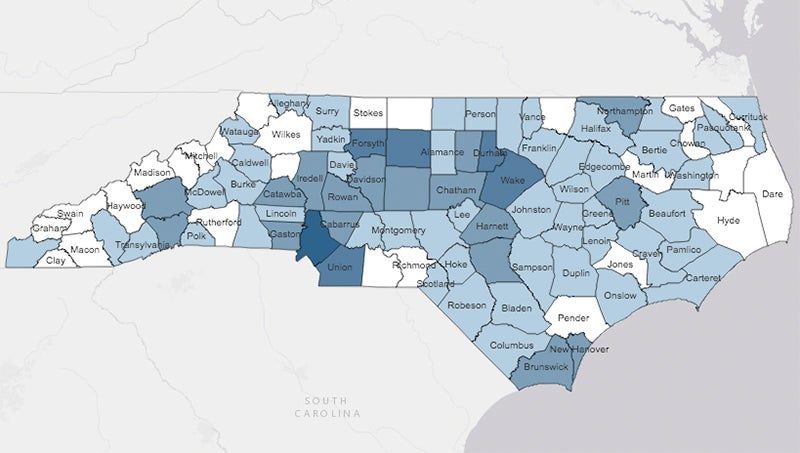COVID-19: state stats at a glance
Published 10:24 pm Sunday, March 29, 2020

- (Department of Health and Human Services) This graphic may not be accurate due to the lag time between cases and NCDHHS updating the graphic.
|
Getting your Trinity Audio player ready...
|
The number of confirmed COVID-19 cases in North Carolina continued to rise from 1,012 on Saturday to 1,085 on Sunday. There have been six deaths in the state attributed to the virus.
In a Beaufort County, a fourth COVID-19 case was confirmed Friday. According to Beaufort County Health Director Jim Madson, the fourth person is hospitalized.
The number of confirmed cases in the U.S. went from 118,827 cases on Saturday to 130,025 on Sunday; this does not include the 2,612 people who have recovered from COVID-19. The U.S. has the greatest number of cases worldwide, and there are likely many more cases as those exhibiting symptoms are now being encouraged to stay home rather than get tested. Nationwide, 2,351 deaths have been attributed to the virus. Four percent of all active cases are considered serious, requiring hospitalization — down from 19% in February, according to Beaufort County’s Office of Emergency Services.
The state has 1,085 confirmed cases in 74 counties, which have led to 87 hospitalizations. Beaufort County had four confirmed cases as of Sunday night. One case has been contributed to direct contact with a known patient from another county. The second is still under investigation. The third case was attributed to recent travel to an outbreak area. The fourth is under investigation. All are self-isolating, according to the Sunday night update from Chris Newkirk, deputy director of Beaufort County Emergency Services.
Eastern North Carolina counties with current cases include: Bertie (3), Beaufort (4), Brunswick (12), Carteret (7), Camden (1), Chowan (1), Columbus (3), Craven (4), Dare (2), Duplin (1), Edgecombe (1), Greene (3), Halifax (2), Hertford (3), Lenoir (3), New Hanover (25), Northampton (25), Onslow (4), Pasquotank (2), Perquimans (1), Pitt (10), Sampson (1), Wayne (3) and Wilson (7). Durham (113), Mecklenburg (315) and Wake (133) counties have the most cases.
On Tuesday, Beaufort County confirmed two cases; on Wednesday, a third case was confirmed in the county. Friday, the fourth case was confirmed. Beaufort County’s Health Department has completed 43 tests to date, with 34 negative results, two positives and seven pending. (Our third and fourth positive cases was tested by another county provider.), reads the update.
Starting Monday, Beaufort County Health Department will no longer provide community testing due to limited supplies. Most medical providers in the county can conduct the COVID-19 test, according to the Sunday update from Beaufort County Emergency Services.
“There is currently no cure or vaccine for COVID-19. Treatments are specific to the symptoms experienced by the individual and may range depending on severity. For example, over-the-counter medicines may be an effective treatment for fever, cough, body aches etc. in some individuals. Others may require the services and treatments provided by a trained medical professional. The CDC and NCDHHS now recommend the following guidance for treatment,” the update reads.
Further information from the update:
Isolate yourself
If you are sick with COVID-19 or believe you might have it, you should stay home and separate yourself from other people in the home as much as possible.
When can I go back to my normal activities?
- You can stop isolating yourself when you answer YES to ALL three questions:
- Has it been at least seven days since you first had symptoms?
- Have you been without fever for three days (72 hours) without any medicine for fever?
- Are your other symptoms improved? Call your doctor if your symptoms are getting worse or you have any concerns about your health.
What if I’m not sure if I have COVID-19?
If you have fever and cough and other symptoms of respiratory illness, even if it is not from COVID-19, you should isolate yourself as if you have COVID-19. This will reduce the risk of making the people around you sick.
What should my family members do?
Anyone in your household or others who have been in close contact with you should stay home for 14 days as much as possible and monitor themselves for symptoms. Close contact means within six feet for at least 10 minutes. If they start having symptoms of COVID-19, they should take the same steps to prevent spreading it. Family members who are healthcare workers, first responders or others who are needed to respond to the COVID-19 pandemic should review CDC guidance and check with their employers about when to return to work.




